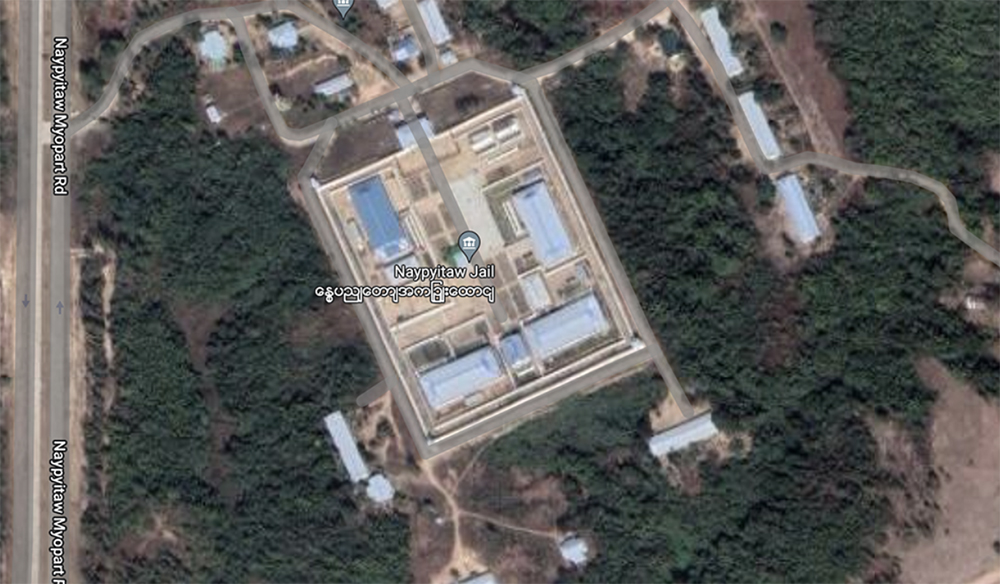Monday marks two months since Myanmar democracy leader Daw Aung San Suu Kyi was moved into solitary confinement in Naypyitaw Prison by the military junta.
It’s the first time the 77-year-old has spent time in solitary in a prison. She has spent many periods in detention for her leadership against successive Myanmar military regimes since 1988, but until now her captors—the predecessors of the current regime led by Min Aung Hlaing—just put her in house arrest at her residence in Yangon.
However, after Min Aung Hlaing staged a coup in February last year, she was kept under house arrest at an undisclosed location. Then she was transferred to solitary confinement in Naypyitaw Prison in June this year. The outsiders she sees are lawyers from her legal team during her weekly trial hearings for a series of charges filed by the junta at a special court set up in the prison compound.
Even though Daw Aung San Suu Kyi is known for her stoic endurance of the hardships she faced during pervious house arrests, the solitary confinement she is now enduring without her close aides has prompted public concern over her security and, most importantly, for her wellbeing and health given her old age.
New ordeals
It’s known that she is kept in a small solitary building somewhere inside Naypyitaw Prison compound, where security has been beefed up since her arrival in June.
The regime claimed she was being treated “well” after being placed in solitary confinement but the building she is kept in looks primitive with six windows with iron bars. Local media reported that only three have curtains, leaving the 77 year-old vulnerable to Naypyitaw’s harsh weather—especially in summer and the cold season. Adding to her suffering is a swarm of visiting insects as the prison is in the middle of scrubland.
Even though she is placed in solitary confinement, it was reported that she has some prison guards to keep an eye on her. Early this month she nearly fell down in the washroom, prompting further worries about her wellbeing. The regime said Daw Aung San Suu Kyi gets regular medical checkups.
Nothing is known about her diet in the prison. The regime once said they have assigned three women to prepare food for her. However, she is used to living on a strict regimen, rarely eating red meat while mostly relying on vegetables. It was learned that one of her lawyers arranges some food parcels for her as she is not OK with the food the prison provides.
For all the new ordeals she faces, Daw Aung San Suu Kyi maintains her stoic endurance, sources close to the court said, recalling her comments about her experience in solitary confinement. The regime muzzles her lawyers, prohibiting them from talking to the media.
“She talked about what she had been through matter-of-factly, not even in the air of a complaint,” one of the sources said.

Access to information
When she was under house arrest at an undisclosed location before June, the regime claimed Daw Aung San Suu Kyi was allowed to read newspapers and watch TV.
It’s now unclear if she still has these privileges in the prison. However, she seems to get updates from her lawyers during the trial hearings—sometimes with bad news she didn’t expect.
When she was told about the regime’s executions of her one-time aide and former NLD lawmaker Ko Phyo Zeya Thaw and veteran democracy activist Ko Jimmy as well as two other activists in late July, she was visibly saddened by the news.
She even reacted by asking questions: “Can they be hanged under the law? Why did it [the regime] do that? They can’t do that!”
Days behind bars
It would be interesting to know how she spends her days in solitary confinement.
It’s sure that she would start her day with meditation, to which she has been devoted for many years.
When she was under house arrest at her Yangon residence under the previous regime, tuning in to the BBC World Service was part of her morning ritual. But it’s not known if she even has access to a radio now.
She may still be allowed to read some books.
As she is now in solitary confinement, it’s likely that Daw Aung San Suu Kyi is no longer able to do some of her hobbies, like bakery—one she practiced until before being transferred to the prison.
When she appeared for a court hearing after her 77th birthday on June 19 this year, she surprised people by bringing some cakes baked by herself. She shared the cakes not only with her legal team but also with the court staff, while making sure that security forces who took her to court got a few slices.
Occasions she will miss
2022 is the second year in a row in which she has been unable to pay her respects to her late father and Myanmar military founder General Aung San at the Yangon Mausoleum, following the coup last year. We can be sure that on July 19 she would have found some way from her solitary building in Naypyitaw Prison to pay homage to her father and others who were assassinated alongside him by a political rival 75 years ago.
She will surely miss her pet dog Taichito, too. For her, Taichito is more than just a dog, as the animal was a gift from her younger son, Kim Aris. He presented it to his mother when he visited her upon her release in 2010 “to protect her mum on his behalf.” The bond between Daw Aung San Suu Kyi and Taichito was evident to anyone who encountered the pair, and it is well known how fond she is of her pet. The dog was with her throughout her house arrest.

It is believed that when she was transferred to prison, Taichito was sent to caretakers in Yangon. Pictures of the dog shared online at the time showed that Taichito appeared distressed—a heartbreaking image for all have who viewed it.
Things surely on her mind
As she is aware of her people’s plight under the military regime, Daw Aung San Suu Kyi will be wondering if they are alright, and if they are safe from COVID-19. For the people’s ongoing collective anti-regime activism, she knows unity is the most important thing. That’s why she occasionally sends “please stay united” messages via her lawyers.
She would be sorry for her comrades who are either on the run or in the junta’s custody. She would feel desperate to learn more about the young people who have taken up arms against the regime and the National Unity Government—the parallel government formed by elected lawmakers from her party and its ethnic allies since her ouster—and their progress.
As someone who has devoted her life to the people of Myanmar since 1988, she would not feel regret for being behind bars at the age of 77 if she contemplates the ups and downs in her life. Instead, as the elected leader of the Myanmar people, her thoughts will surely be dominated by all things related to them and the country.
















